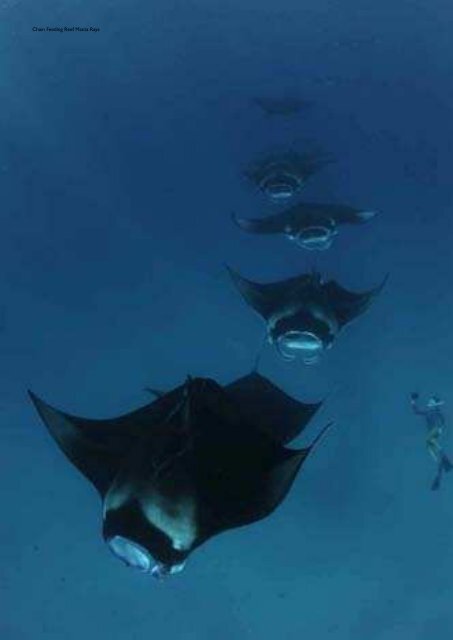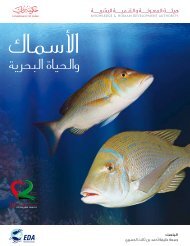Download - Emirates Diving Association
Download - Emirates Diving Association
Download - Emirates Diving Association
Create successful ePaper yourself
Turn your PDF publications into a flip-book with our unique Google optimized e-Paper software.
Chain Feeding Reef Manta Rays<br />
FEATURES<br />
Introducing the Manta Trust<br />
photography GUY STEVENS<br />
Two piggy-back feeding Chevron Reef Manta Rays<br />
Reef Manta Ray feeding; barrel rolling<br />
Oceanic Manta Ray at a fish market, Sri Lanka<br />
Almost every diver is familiar with<br />
the manta ray, and if they haven’t<br />
seen one of these magnificent<br />
creatures yet, it’s certainly on their<br />
to-do list. The beauty, grace, and<br />
curiosity of mantas makes them one<br />
of the most engaging animals to dive<br />
with, and their harmless demeanor<br />
often invites a close, personal<br />
interaction that is unlikely with other<br />
large animals.<br />
Mass feeding Mantas at Hanifaru Bay, Maldives<br />
Unfortunately, like much of what<br />
we love in the oceans, mantas are<br />
in trouble. Over the last decade,<br />
manta and mobula ray gill rakers<br />
– the cartilaginous structures that<br />
allow them to strain plankton from<br />
the water – have been increasing in<br />
popularity as a ‘traditional’ Chinese<br />
remedy. While the use of dried<br />
manta gill rakers to treat a number<br />
of illnesses is not, in fact, part of the<br />
Traditional Chinese Medicine (TCM) literature,<br />
traditional practitioners have nevertheless<br />
been using gill rakers more and more in recent<br />
years, much to the detriment of manta and<br />
mobula populations around the world.<br />
Targeted fisheries have cropped up in<br />
developing countries around the world,<br />
with fishing hotspots in Sri Lanka and<br />
Indonesia. Historically, manta fisheries have<br />
led to collapses of small, vulnerable manta<br />
populations in countries such as Mexico, and<br />
due to their low reproductive rates and small<br />
population sizes, manta rays now face a very<br />
real threat of global population crashes.<br />
To address the growing fisheries pressures on<br />
mantas and mobulas around the world, while<br />
educating local communities and providing<br />
sustainable alternatives to exploiting manta<br />
and mobula populations, a group of scientists,<br />
conservationists, filmmakers and photographers<br />
has formed the Manta Trust. With the goal of<br />
protecting manta rays, their close relatives, and<br />
the immensely productive ecosystems which<br />
these animals inhabit, the Manta Trust, now a UK<br />
registered charity, is conducting crucial research<br />
on the basic life history of mantas, such as<br />
identifying migratory routes, feeding strategies,<br />
and critical habitats such as breeding and<br />
nursery grounds. Using this new information,<br />
we’re working with local collaborators,<br />
international conservation organisations and<br />
governments to enact critical legislation to<br />
protect mantas, mobulas, and diverse marine<br />
habitats, while encouraging economical and<br />
sustainable alternatives to manta fisheries, such<br />
as responsible dive ecotourism.<br />
Be sure to check back in each issue of<br />
Divers For The Environment for updates<br />
on the Manta Trust’s work, important new<br />
discoveries in manta and mobula ecology,<br />
and global conservation efforts for mantas<br />
and their relatives. In the meantime, be sure<br />
to visit www.mantatrust.org or http://www.<br />
facebook.com/MantaTrust to learn more<br />
about mantas and find out how you can help<br />
protect them and feel free to contact us on<br />
info@mantatrust.org if you’d like any further<br />
information on our work.<br />
Manta<br />
T R U S T<br />
48 DIVERS FOR THE ENVIRONMENT, JUNE 2012<br />
JUNE 2012, DIVERS FOR THE ENVIRONMENT 49












